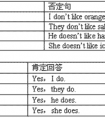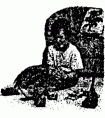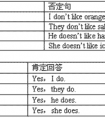Chooseandcorrect. 选出错误的一项,并在横线上改正过来。1.Iwillsendthreepostcard.A B C2.Doyouknowwherethepostofficeare?AB C3.Iwanttosendthise-mailformydadand-五年级英语
(8)with使用、和……在一起
We write with a pen. 我们用笔写字。
Can you go to the park with me? 你能和我一起去公园吗?
注意:在last, next, this, that, some, every 等词之前一律不用介词。如:We meet every day.
小学常见介词:
1.on
(1) 在------上面 The book is on the desk.
(2) 在------(哪一天/星期)What do you do on Wednesday?
(3) 在------(月、日)My birthday is on August 2nd.
2. in
(1)在------里面 The pens are in the pencil-box.
(2)在------(哪一年/月)His birthday is in October.
He worked here in 1992.
(3 ) 在------(地方) He works in Dongguan.
(4 ) 在------之内 What are you going to do in 20 years?
(5 ) 在------(早上、下午、晚上)
I do morning exercises in the morning every day.
I usually play basketball in the afternoon.
I often do my homework in the evening.
3. under
在------底下 There is a ball under the bed.
4. near
在------附近 There is a book shop near our school.
5. in front of
在------前面 A boy is standing in front of the house.
6. beside
在------旁边 A football is beside the door.
7. next to
紧挨着 There is a bus station next to No. 13 Middle School.
8. over
在------正上方 A bridge is over the river.
9. on the left
在------左边 The bookstore is on the left.
10. on the right
在------右边 The hospital is on the right.
11. before
在……之前 Mike sits before me.
12. after
在------以后 He went home after school.
13. in the middle
在------中间 The road is in the middle.
14. at
(1) 在------(小地方) I am at school today. I was at home yesterday.
(2) 在------(点钟) I usually go to school at 8:00 am.
(3)看一看 Look at the blackboard.
(4) 在中午 at noon
15. behind
在------后面 There is a broom behind the door.
16.for
(1)给 This present is for you.
(2)为了 Thank you for telling me the way to the zoo.
(3)作为 We have some chips and hamburgers for lunch.
17.to
(1) 到 Take your sport shoes to the P.E class.
(2) 致 Happy birthday to you. Give it to your friend.
18. from
来自 I am from China. = I come from China.
19. from --- to
从------到------ Line up from shorter to taller.
We have class from Monday to Friday.
20. of
------的 He is a student of Kama School.
21. by
(1)在------之前 We must be at home by 6 o’clock.
(2)乘------交通工具 People can go to the moon by spaceship.
I go to school by bus.
22.with
(1) 用 I write a letter with a pen.
(2) 和------一起 He went to Shenzhen with his parents.
23. between
在------与------之间 There is a football match between Class One and Class Three.
24. into
到------里 Sharks can dive into the deep cold water.
25. like
(1)象------ The twins are like their father.
(2)长相------怎样? What’s he like?
26. up
向上 Put up your hands if you have any questions.
27. down
向下 Put down all the books here.
28. about
(1) 大约;关于 It’s about 6:00 now.
(2) ------怎么样? What about---? How about---?
29. what for
为什么 But what for?
早、午、晚要用in,at黎明、午夜、点与分。
年、月、年月、季节、周,阳光、灯、影、衣、冒in。
将来时态in...以后,小处at大处in。
有形with无形by,语言、单位、材料in。
特征、方面与方式,心情成语惯用in。
介词at和to表方向,攻击、位置、恶、善分。
日子、日期、年月日,星期加上早、午、晚,
收音、农场、值日on,关于、基础、靠、著论。
着、罢、出售、偷、公、假,故意、支付、相反,准。
特定时日和"一……就",on后常接动名词。
年、月、日加早、午、晚,of之前on代in。
步行、驴、马、玩笑on,cab,carriage则用in。
at山脚、门口、在当前,速、温、日落、价、核心。
工具、和、同随with,具有、独立、就、原因。
就……来说宾译主,对、有、方状、表细分。
海、陆、空、车、偶、被by,单数、人类know to man。
this、that、tomorrow,yesterday,next、last、one。
接年、月、季、星期、周,介词省略已习惯。
over、under正上下,above、below则不然,
若与数量词连用,混合使用亦无关。
beyond超出、无、不能,against靠着,对与反。
besides,except分内外,among之内along沿。
同类比较except,加for异类记心间。
原状because of,、 owing to、 due to表语形容词
under后接修、建中,of、from物、化分。
before、after表一点, ago、later表一段。
before能接完成时,ago过去极有限。
since以来during间,since时态多变换。
与之相比beside,除了last but one。
复不定for、找、价、原,对、给、段、去、为、作、赞。
快到、对、向towards,工、学、军、城、北、上、南。
but for否定用虚拟,复合介词待后言。
ing型由于鉴,除了除外与包合。
之后、关于、在......方面,有关介词须记全。
in内to外表位置,山、水、国界to在前。
考点名称:系动词
- 系动词:
亦称连系动词,作为系动词,它本身有词义,但不能单独用作谓语,后边必须跟表语,亦称补语(形容词),构成系表结构说明主语的状况、性质、特征等情况。
be(是)是最基本的系动词。小学涉及到的系动词需要掌握的am, is, are
如:I am from Beijing. 我来自北京。
My mother is a teacher. 我的妈妈是一位老师。
除了系动词be,常用的系动词还有look(看起来)、sound(听起来)、feel(感觉到)、become(变成)、smell(闻起来)等。
例:The boy looks very happy. 这个男孩看起来很高兴。
The dish smells good. 这盘菜闻起来很香。 be动词意思和用法:
一般的意思是:
是,此种用法,有多种变化形式,is,am,are,was,were,being,been,to be.
另外,be动词还有成为的意思。
根据句子中不同的人称、数和时态,应该选择相应的be动词。<?xml:namespace prefix = "o" ns = "urn:schemas-microsoft-com:office:office" />要看句语的时态:
如果是一般过去时,就用was/were
如果是一般现在时,就用am/is/are
如果是一般将来时,就用will be
然后看主语的人称及复数形式:
一般过去时:
第一人称和第三人称的单数形式,则用was
第一人称和第二人称、第三人称的复数,则用were
一般现在时:
- 最新内容
- 相关内容
- 网友推荐
- 图文推荐
| [家长教育] 孩子为什么会和父母感情疏离? (2019-07-14) |
| [教师分享] 给远方姐姐的一封信 (2018-11-07) |
| [教师分享] 伸缩门 (2018-11-07) |
| [教师分享] 回家乡 (2018-11-07) |
| [教师分享] 是风味也是人间 (2018-11-07) |
| [教师分享] 一句格言的启示 (2018-11-07) |
| [教师分享] 无规矩不成方圆 (2018-11-07) |
| [教师分享] 第十届全国教育名家论坛有感(二) (2018-11-07) |
| [教师分享] 贪玩的小狗 (2018-11-07) |
| [教师分享] 未命名文章 (2018-11-07) |





![Therabbitlikes_________.[ ]A.bonesB.chickenC.fishD.vegetables-四年级英语](http://www.00-edu.com/d/file/ks/4/1/9/2019-08-12/small19d909f6c152d7dbd99050270d09dd701565564237.gif)
